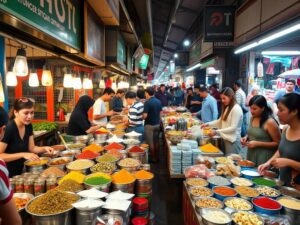It was a gloriously sunny day when Sarah landed in Bali, excited for a week of adventure.
She explored local markets, sampled street food, and drank freshly squeezed juices, soaking in the vibrant culture. However, by the end of the second day, her excitement turned to dread as she found herself dealing with the unpleasant cramps and watery rushes of travelers’ diarrhea.
As a frequent traveler, she had heard tales of this issue affecting many, yet nothing prepared her for the urgency of the situation. Guided by the desire to enjoy her vacation, she quickly learned the importance of understanding how to effectively treat travelers’ diarrhea and sought reliable remedies. With the right approach, Sarah was determined to get back to her thrilling explorations rather than being chained to her hotel bathroom.
This article will provide essential tips and remedies for anyone wanting to navigate the discomfort of travelers’ diarrhea. With proper knowledge and preparation, you can avoid being swept away by this common travel challenge. From understanding the causes to integrating hydration strategies and dietary recommendations, here are the best practices to help you manage and treat this condition effectively.
Key Takeaways
- Travelers’ diarrhea often arises from contaminated food or water.
- Stay hydrated and consume appropriate foods to aid recovery.
- There are effective over-the-counter medications available for relief.
- Understanding preventive measures can significantly reduce risk.
- In some cases, professional medical help is essential.
Understand the Causes of Travelers’ Diarrhea
Travelers’ diarrhea is a common ailment that manifests during trips, especially to regions with poor sanitation. Various factors contribute to this condition, leading to discomfort and complications. Understanding the Causes of Travelers’ Diarrhea helps in taking preventive measures and managing the symptoms effectively.
Common Triggers
The most frequent causes of travelers’ diarrhea include:
- Bacterial pathogens such as enterotoxigenic E. coli, Campylobacter, and Shigella.
- Viral infections that can disrupt the digestive system.
- Parasitic infections, which might show symptoms later than bacterial and viral causes.
These triggers often arise from consuming contaminated food or water, which is prevalent in areas with lax hygiene practices. Travelers may not notice symptoms until days after exposure, making awareness crucial for transition into effective Managing Travelers’ Diarrhea Symptoms.
Risk Factors
Recognizing the key Risk Factors for Travelers’ Diarrhea can facilitate better preparation. These include:
- Traveling to developing countries in regions like Latin America, Africa, and parts of Asia.
- Choosing unsafe food options, particularly street food and uncooked meals.
- Having a compromised immune system or existing gastrointestinal conditions.
- Engaging in food and drink sampling, common among younger travelers.
Being aware of these risk factors enables travelers to make informed choices and reduce their chances of illness.
When to Seek Medical Help
While many instances of travelers’ diarrhea resolve within a few days, it’s essential to recognize when to seek medical assistance. Key symptoms indicating the need for immediate help include:
- Persistent vomiting for more than four hours.
- A fever higher than 102˚F (39˚C).
- Presence of blood in stools.
Ignoring these severe symptoms can lead to serious complications, particularly dehydration, which is the most common consequence. By understanding these aspects, travelers can better navigate their journey while minimizing health risks.

Essential Hydration Strategies
Traveling can expose individuals to various health risks, one of the most common being travelers’ diarrhea. Proper hydration is crucial, especially in managing this condition. Effective hydration strategies play a vital role in preventing complications that can arise from fluid loss. Staying hydrated not only aids in recovery but also strengthens the body against the effects of travelers’ diarrhea.
Importance of Rehydration
Hydration for travelers’ diarrhea is essential due to the significant fluid loss associated with symptoms. Travelers can become dehydrated quickly, leading to severe outcomes. Emphasizing rehydration strategies can help maintain electrolyte balance and prevent health deterioration. Clear fluids, such as bottled water and broth, can be helpful in restoring hydration levels. For those at risk, understanding the importance of early rehydration can make a significant difference.
Recommended Rehydration Solutions
Utilizing oral rehydration solutions (ORS) containing electrolytes and glucose is highly recommended. These solutions are specifically formulated to replace lost fluids and nutrients. It is advisable to avoid caffeinated and alcoholic beverages, as these can exacerbate dehydration. In severe cases of travelers’ diarrhea, professional medical assistance may be necessary, and intravenous fluids may be the best option to quickly restore hydration. Below is a table summarizing effective rehydration options:
| Rehydration Solution | Benefits | Notes |
|---|---|---|
| Bottled Water | Basic hydration | Ensure it is sealed to prevent contamination |
| Clear Broth | Provides hydration and some nutrients | Low-risk food choice |
| Oral Rehydration Solution (ORS) | Replenishes electrolytes and glucose | Available at pharmacies; ideal for rehydration |
| Electrolyte Drinks (e.g., Gatorade) | Hydration along with electrolytes | Check for added sugars |
Incorporating these hydration strategies significantly aids in preventing travelers’ diarrhea and supports overall health when traveling. By being mindful of hydration and recognizing its importance, travelers can better enjoy their adventure without the unpleasantness of gastrointestinal distress.

Dietary Tips for Prevention and Recovery
Travelers’ diarrhea can create discomfort and disrupt your travel plans. Understanding dietary tips for managing this condition helps ensure a smoother journey. Making wise food choices plays a vital role in both prevention and recovery.
Foods to Eat
When dealing with travelers’ diarrhea, opting for foods that are gentle on the digestive system is crucial. Recommended options include:
- Rice
- Toast
- Bananas
- Applesauce
- Plain crackers
These foods can help minimize gastrointestinal distress and promote recovery. Incorporating these into your diet aids in easing symptoms while traveling.
Foods to Avoid
While you navigate through dietary tips for travelers’ diarrhea, knowing what to avoid can significantly enhance your well-being. Steer clear of:
- Raw or undercooked foods
- Seafood
- Fruits and vegetables washed in untreated water
- Spicy foods
- Caffeinated or alcoholic beverages
These foods harbor higher risks of contamination and can aggravate your symptoms. Prioritizing caution helps maintain health while traveling.
Probiotics: Helpful Allies
Probiotics for travelers’ diarrhea serve as excellent allies in restoring gut health. Strains like Lactobacillus and Saccharomyces boulardii contribute to rebuilding gut flora disrupted by travel. Including these probiotics in your diet can boost immunity and improve digestive balance after episodes of diarrhea.
Maintaining good hygiene practices, such as washing fruits with filtered water, further supports your efforts in avoiding complications while traveling. For additional health insights and injury prevention strategies, consider exploring practical guides on treating minor injuries, ensuring a complete approach to health management.

Over-the-Counter Medications
Over-the-counter medications for travelers’ diarrhea offer effective solutions for managing mild symptoms often encountered while traveling. These medications can help travelers continue their adventures without interruption. Understanding the available treatment options plays a vital role in making an informed decision on which remedy to choose.
Choosing the Right Medication
When selecting over-the-counter medications for travelers’ diarrhea, it’s essential to consider the severity of symptoms and specific travel circumstances. For general symptom relief, bismuth subsalicylate (known as Pepto-Bismol) is a popular choice. This option is effective for diarrhea relief but is banned in countries like France and unavailable in Germany. In contrast, loperamide (Imodium) is widely available but should be used cautiously. It serves as a suitable option for quick relief during urgent travel but may prolong illness if used inappropriately. Antibiotics such as Ciprofloxacin and Azithromycin are also common treatment options for moderate to severe cases, but they require a prescription and should only be considered based on specific conditions.
Usage Guidelines
For individuals considering over-the-counter medications for travelers’ diarrhea, adhering to usage guidelines is critical. Bismuth subsalicylate can be taken using two tablets up to four times daily before and throughout travel, serving as a preventative measure. As for loperamide, it can be administered to control stool frequency but should not be taken if there is a high fever or bloody stools, prompting immediate medical consultation. The key is to balance effective symptom management while being aware of potential complications that might arise if overused.
Potential Side Effects
As with any medication, users should be aware of potential side effects when using over-the-counter treatments. Bismuth subsalicylate and loperamide may lead to mild issues such as constipation or nausea, which could cause discomfort. Travelers must weigh the benefits against these risks, particularly if they have other underlying health conditions or are traveling to areas where access to medical assistance is limited. Always consult with a healthcare provider prior to starting any medication when away from home.
| Medication | Use | Availability | Typical Side Effects |
|---|---|---|---|
| Bismuth subsalicylate (Pepto-Bismol) | Symptom relief | Banned in France, unavailable in Germany | Constipation, nausea |
| Loperamide (Imodium) | Quick relief | Widely available, regulated in some regions | Constipation, abdominal discomfort |
| Antibiotics (Ciprofloxacin, Azithromycin) | Treatment for moderate to severe cases | Prescription required | Varies based on specific antibiotic |
Natural Remedies to Soothe Symptoms
Natural remedies can offer gentle yet effective ways to alleviate the symptoms associated with travelers’ diarrhea. Incorporating these remedies into your routine not only aids in recovery but can complement conventional treatments. Below, we explore effective options for symptom relief.
Ginger and Peppermint
Ginger is well known for its soothing effects on the digestive system. Consuming ginger tea or ginger candy may help calm an upset stomach. Similarly, peppermint has been recognized for its ability to relax the gastrointestinal tract, potentially easing discomfort while traveling. Integrating these natural remedies for travelers’ diarrhea can make travel more enjoyable.
Herbal Solutions
Numerous herbal solutions exist for diarrhea relief. Chamomile tea, for instance, often acts as a gentle remedy for gastrointestinal distress. Slippery elm, derived from the inner bark of the tree, can coat the intestinal mucosa, reducing irritation. Exploring various herbal solutions for diarrhea relief as part of your travel toolkit can foster a more comfortable experience, especially when facing unpredictability.
Importance of Rest
Rest is a crucial component of the body’s healing process. When experiencing diarrhea, the immune system requires adequate downtime to restore balance. Prioritizing rest can enhance the efficacy of both traditional and natural remedies. It is essential to listen to your body during these times, allowing yourself the chance to recover fully.
Keep in mind that while natural remedies are beneficial, it is wise to consult a healthcare provider for persistent symptoms or complications. A balanced approach that includes rest, hydration, and appropriate food choices can significantly contribute to a smooth travel experience. Consuming vitamin E-rich foods may further support your overall health, providing antioxidant benefits; for more information, check this link.
| Herbal Remedy | Benefits | Recommended Form |
|---|---|---|
| Ginger | Calms upset stomach | Tea or candy |
| Peppermint | Relaxes gastrointestinal tract | Tea or oil |
| Chamomile | Reduces gastrointestinal distress | Tea |
| Slippery Elm | Coats intestinal mucosa | Powder or tea |
Best Practices While Traveling
Understanding and implementing the best practices while traveling is crucial to minimize the risk of travelers’ diarrhea. Start with essential Food Safety Tips, such as drinking only bottled water and avoiding ice cubes unless you’re certain they’re made from purified sources. It’s also wise to steer clear of street food, which can be a common source of contamination. Regular hand washing with soap or using an alcohol-based sanitizer can significantly reduce the risk of infection, especially in high-risk areas like South Asia and parts of Africa.
Food Safety Tips
When traveling, it’s important to remain vigilant about what you consume. Pay attention to food preparation methods and prioritize cooked meals that are served hot. During rainy seasons, even more caution is necessary as certain areas may face outbreaks. Always be aware of your surroundings and avoid potentially dangerous food choices, particularly in areas known for poor hygiene practices.
When to Be Cautious
Stay alert when drinking local water or eating unfamiliar foods, especially in medium to high-risk regions. If symptoms like fatigue, high fever, or signs of dehydration occur, consider contacting a healthcare provider. Keeping a Travel Health Kit for Diarrhea is advisable, including oral rehydration solutions, OTC medications, and essential first-aid items, ensuring you’re prepared for any situation that may arise.
Keeping a Travel Health Kit
A well-stocked travel health kit plays a key role in managing potential illnesses while abroad. Include items such as oral rehydration salts to prevent dehydration, and medications for symptomatic relief. Being prepared enables swift action, helping you continue enjoying your travels without significant disruptions. For more tips on cultivating daily habits that promote overall health, check out this resource.





